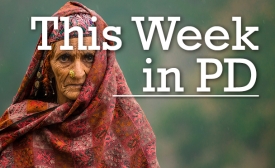women
Unlike in previous uprisings, more and more women are participating in protests against the Israeli occupation. But the fighting has also taken its toll on them.
A first of its kind international Women tech entrepreneurship conference was held in Israel last week, as a group of female tech bloggers and entrepreneurs from around the world were invited for a one-week trip to explore the 'Startup Nation'.
Call it serendipitous. Call it fortuitous. Call it whatever you like, but the meeting of Audrey Emerson and Anne Wells produced more than a friendship. It led to the production of a film, specifically “The Pamoja Project,” a 30-minute documentary profiling three women community leaders in Tanzania, East Africa.
Because of the U.S.’s performance in 1999, countries like Germany, France, Japan, and England began to invest in the women’s game and begin to compete – and at times surpass – the U.S. The game as a whole was made stronger by the U.S. in 1999.

The role of women in public diplomacy is sometimes overlooked, but the work inspired and accomplished by women results in widespread impacts.
Last week, as word spread about girls kidnapped by Boko Haram last year returning to their communities having been raped and impregnated, the Nigerian Senate passed the Violence Against Persons Prohibition (VAPP) Bill, which seeks to prohibit multiple forms of gender-based violence including economic abuse, female genital mutilation, and depriving persons of their liberty among others.
The subject of women's roles in the world of cinema has been in the spotlight at the 2015 Cannes Film Festival. This year, in an effort to encourage more women to work behind the camera, organisers are hosting a UN conference into equality on the red carpet.
In the sometimes rough-and-tumble sport known as American business, there’s a strategy that savvy competitors like to employ. It’s called “soft power" - a way of networking, building relationships, inspiring people to your cause and expanding your power base.







